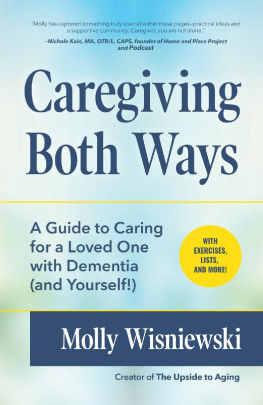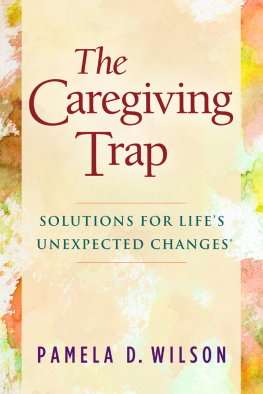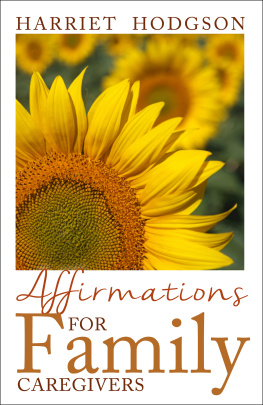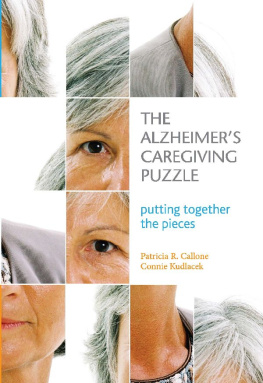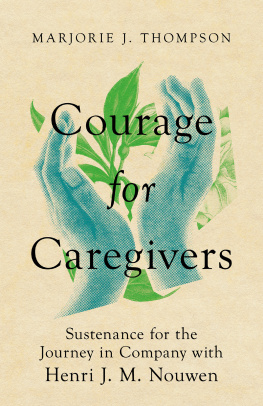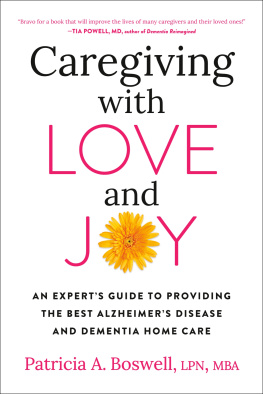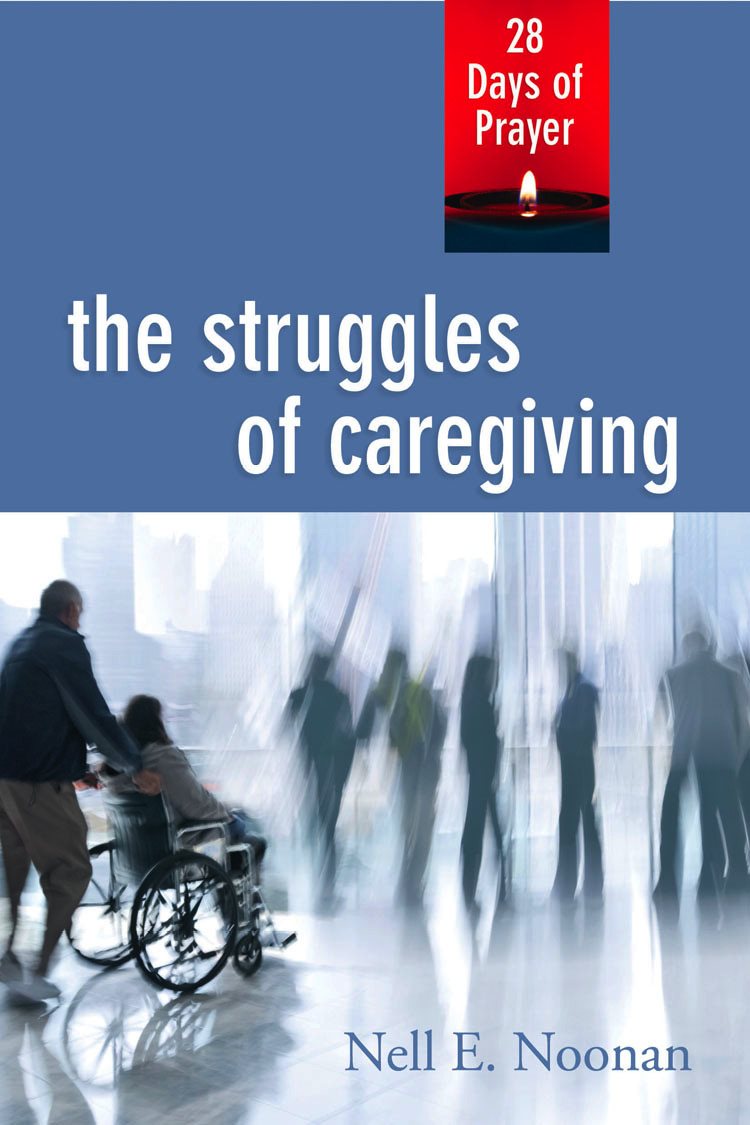
THE STRUGGLES OF
CAREGIVING
28 Days of Prayer
Nell E. Noonan

The Struggles of Caregiving
Copyright 2011 by Nell E. Noonan
All rights reserved.
No part of this book may be used or reproduced in any manner whatsoever without permission except in the case of brief quotations embodied in critical articles or reviews. For information, write Upper Room Books, 1908 Grand Avenue, Nashville, TN 37212.
The Upper Room Web site: http://www.upperroom.org
UPPER ROOM, UPPER ROOM BOOKS, and design logos are trademarks owned by The Upper Room, a ministry of GBOD, Nashville, Tennessee. All rights reserved.
Scripture quotations are from New Revised Standard Version Bible, copyright 1989 National Council of the Churches of Christ in the United States of America. Used by permission. All rights reserved.
Scripture quotations marked GNT are from the Good News Translation in Todays English VersionSecond Edition copyright 1992 by American Bible Society. Used by permission.
Scripture quotations marked NCV are taken from the New Century Version. Copyright 2005 by Thomas Nelson, Inc. Used by permission. All rights reserved.
Cover image: Copyright SVLuma / http://www.shutterstock.com/gallery-142054p1.html
Cover design: Bruce DeRoos / LeftCoast Design
Library of Congress Cataloging-in-Publication Data
Noonan, Nell E.
The struggles of caregiving / Nell E. Noonan.
p. cm. (28 days of prayer)
ISBN 978-0-8358-1128-6 (ePub edition)
1. CaregiversPrayers and devotions. 2. BibleDevotional use. I.
Title.
BV4910.9.N665 2012
242'.4dc23 2011044202
CONTENTS
Arnold Palmer Syndrome:
2 Thessalonians 2:16-17; 3:16
ACKNOWLEDGMENTS
On Saturday mornings I attend Fort Worth Writers where we critique, advise, and share our wordsmith calling. The group comprises published authors, writing teachers, newbies, and every kind of writer in between. Week after week, month after month, they have listened to my devotions with professional skill, but, most important, they have listened with their hearts. I am eternally grateful for their encouragement and support.
I would be remiss if I did not also acknowledge the contributions to my writing and my spiritual life made by an experienced caregiver, my spiritual director, the Right Reverend Sam Hulsey.
The journey my husband, Bob, and I are on would be so difficult without the generous support and constant acts of compassion made to us through the years by the clergy, staff, and our church family at St. Barnabas United Methodist Church, Arlington, Texas.
In conclusion, I thank God for Bob Noonan who shows me depths of faith and courage and for our mutual journey that stretches me to spaces of unbounded grace and love.
INTRODUCTION
If you are reading this book, chances are you are one of the more than 65 million unpaid family caregivers in the United States. We come in a variety of relationships. Some are spouses like me, some adult children caring for parents (some long distance like me), members of the sandwich generation caring for their children and elderly parents, a sibling caring for another sibling, and grandparents raising grandchildren. Caregiving has become a major issue of our time with the explosion of senior baby boomers and an enormous increase in longevity of our elderly population.
Caregiving takes an enormous toll on providers. They stand at risk for a host of mental and physical illnesses, many of which have roots in exhaustion, stress, and self-neglect. They are driven by empathy, love, and devotion but often experience sadness, anger, frustration, guilt about their feelings, despair, loneliness, and depression. They need to find ways to take care of themselves and to discover beneficial coping strategies.
At an Alzheimers Association symposium I heard Dr. Majid Fotuhi outline steps to better health and delayed memory loss for both caregivers and receivers: (1) tease your memory (brain games); (2) strengthen your heart through exercise; (3) be curious and learn; (4) laugh more often; and (5) eat smart. When this distinguished neurologist/researcher/professor finished his presentation, I wanted to shout, But there is one more step, equally important, that was not named: pay attention to your spiritual health.
What has surprised me most about caregiving is that it is a cataclysmic spiritual experience. Care providers struggle with tough questions: Why is this happening, Lord? How long must it go on? Why must our loved one suffer so? Where are you, God? Where can I find the strength to go on? My spiritual struggles have unearthed some amazing mysteries during this odyssey. The caregiving situation teaches and blesses us along the journey. It tutors us in self-sacrificing love and forgiveness. It expands our capacity for compassion and our awareness of connectedness with all humanity. It is the ultimate response to Jesus command to love one another as I have loved you (John 15:12). Caregiving asks the best of usto love without payback, to mutually respect the spirit within ourselves and in our care receivers, to be intimately committed to someone.
The journey bumps us up against powerful negative feelings. It forces us to become more real, to ponder the meaning of our changed lives, and to struggle with issues of loss and death. And in many cases, it lasts for a long time, years and years. The biggest transformation came for me when I began to view the situation as a mutual path toward God for both caregiver and receiver. The journey turned from being a negative interference in my life to be endured into a life-giving walk filled with God-winks and enlightening lessons to learn (sometimes over and over).
Care providers have numerous toughreally toughdays. I urge you to join me in finding time for daily devotions to massage and strengthen your spirit. Time apart with God equips us to experience Love so we may not only survive but make a difference through our holy work of loving service. My prayer is that as you pause daily to listen to your life, you will come to know with certainty the Great Divine Heart loves and cares. You are not alone but walking with and toward the Holy One.
How to Use This Book
The daily grind of providing care for a loved one is full of challenges. The book is divided into four weeks, each dealing with a category of struggles: (1) struggles with frustration and faith; (2) struggles with identity; (3) struggles with guilt; and (4) struggles to find equilibrium.
I suggest you find a placea comfortable chair near a tablewhere you can keep a Bible, this workbook, and a candle and lighter. Start each session by lighting the candle to acknowledge Christs presence. Begin your devotional time with silence. Read the scripture for the day slowly, letting the words soak into your soul. Pause for more silence. Read the life account. Reflect on what emotions or experiences surface for you. Be honest with both God and yourself as you pray. Make notes about your thoughts and feelings. Be specific.
If possible on Sundays, attend community worship. Some of you will not be able to arrange that, but all are invited to use the suggestion for deeper reflection on the weeks theme found in the section Sabbath Time.
Before each writing session for this book, I lit a candle and prayed, Lord God, make these words more than words; make them the words of Jesus. May you hear words you need for your holy work caring for a loved one: words of comfort, strength, assurance, grace, blessing, and peace. Amen.
WEEK 1
Struggles with Frustration and Faith
Next page

